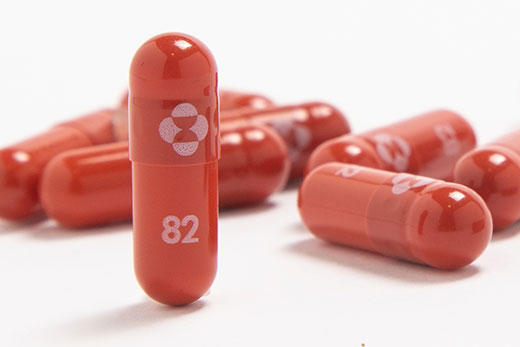
Caption
A promising antiviral drug in the fight against COVID-19 was invented by researchers at Emory University.
Credit: Tristan Smith/GPB
|Updated: October 2, 2021 11:37 AM

A promising antiviral drug in the fight against COVID-19 was invented by researchers at Emory University.
Researchers at Atlanta’s Emory University were the ones who invented a promising antiviral drug in the fight against COVID-19 — a pill that pharmaceutical giant Merck & Co. said on Friday reduced hospitalizations and deaths by half in people recently infected with the coronavirus.
Merck said it plans to apply for emergency use authorization from the Food and Drug Administration. If approved, the drug would be the first pill to treat COVID-19, a major advance in treating people who fall ill with the disease.
The antiviral drug, officially called molnupiravir, was developed by Emory researchers and licensed by Merck from the Drug Innovation Ventures at Emory, known as DRIVE.
The drug was initially being researched for how it might help against the flu. However, shortly after the coronavirus pandemic hit, Emory’s researchers realized the drug might be able to treat COVID-19 patients.
MORE: Drug Discovered By Emory Docs Expected To Help COVID-19 Patients In India
"Our goal when we started DRIVE was to discover antiviral agents for influenza and emerging diseases,” said Dr. George Painter, DRIVE’s CEO and co-founder, who spent five years researching the drug. “We were able to quickly redirect our research to COVID-19 because we were already working on highly pathogenic coronaviruses."
He added, "Without a doubt, deploying easy-to-use antivirals will be an important piece of the larger puzzle of solving this and future pandemics.”

Emory researchers spent five years researching the antiviral pill, initially as a treatment for flu.
Emory, with its campus next to the headquarters of the Centers for Disease Control and Prevention, has been at the forefront of groundbreaking COVID-19 research, from vaccines to monoclonal antibodies to antiviral drugs.
Health officials emphasize that getting vaccinated remains the best way to curb the pandemic. But this pill could offer a promising new treatment in an outpatient setting for when people fall sick with COVID-19.
Emory President Gregory L. Fenves hailed the news as another example of the university’s commitment toward science and helping mankind.
“As one of our nation’s leading research universities, the goal of serving humanity is infused into everything we do at Emory,” Fenves said. “George’s discovery is the latest example of the Emory mission in action, and we will continue to invest in our researchers, scientists, and their groundbreaking work to benefit communities the world over.”
Jonathan S. Lewin, Emory’s executive vice president for health affairs, said the discovery underscored the university’s commitment to continue focus research on “unmet viral diseases of global concern.”
“Critical to our mission at Emory,” Lewin said, “is ensuring that scientific discoveries can become real-world solutions that improve the health of our global population and save lives.”
In Friday’s announcement, Merck and its partner Ridgeback Biotherapeutics said early results from a Phase 3 trial showed patients who received the drug within five days of COVID-19 symptoms had about half the rate of hospitalization and death as patients who received a placebo, or dummy pill.
Specifically, about 7% of patients who received molnupiravir were either hospitalized or died at the end of 30 days, compared with 14% of placebo-treated patients, the study found.
The study tracked 775 adults with mild-to-moderate COVID-19 who were considered higher risk for severe disease due to preexisting health conditions such as obesity, diabetes or heart disease.
An independent group of medical experts monitoring the trial — and in consultation with the FDA — recommended stopping the trial earl due to the strong preliminary data. Merck added it was stopping recruitment for the trial “due to these positive results.”
"It exceeded what I thought the drug might be able to do in this clinical trial," said Dr. Dean Li, vice president of Merck research. "When you see a 50% reduction in hospitalization or death, that's a substantial clinical impact."
The drug, if approved, would be the first in pill form to treat COVID-19. Although monoclonal antibodies and the antiviral remdesivir have been used to treat people once they have fallen ill, both treatments are administered intravenously.